We’re excited about Insect Week, from 24th to 30th June! That’s because insects are ‘tiny things that run the world’ – they are the most ecologically important and diverse group of animals on land. Without them working hard on tasks like pollinating flowers or breaking down organic matter and returning important nutrients to the earth, the world would be a very different place.
Insects are important residents in our woodland at the Science Oxford Centre, and make their homes in a variety of habitats like under rocks, in the soil, among the leaves and trees, and around our ponds. Did you know we’ve recorded 9 different species of dragonflies and damselflies, 17 species of butterflies and an incredible 42 different species of moths in our outdoor spaces around the Science Oxford Centre? And those are just a few of the different types of insects here.
Our top 5 resources and activity ideas for Insect Week:
1. Build a bug hotel
We’ve put up a bug hotel in our woodland at the Science Oxford Centre for a home for solitary bees, spiders, woodlice or beetles, including ladybirds. You could build your own! The RSPB has a great activity guide to help you build a bug hotel in your garden to create a home for minibeasts. Building a bug hotel or nature stack in your garden can provide a safe hideaway for wildlife and also help make use of your garden waste.
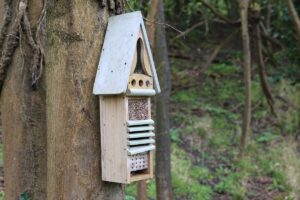
Bug hotel at the Science Oxford Centre
2. Go on a bug hunt
Would you like to go on a bug hunt, see what minibeasts live around your environment and learn more about them? Read this helpful blog from Creative Star Learning to guide you along the way, including how to be careful and kind if handling insects.
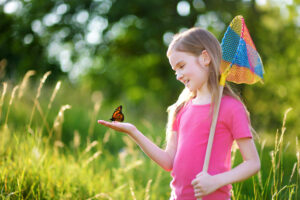
Butterfly hunt with a sweep net
3. Learn more about insects
Insect Week is organised by the Royal Entomological Society and they have put together some amazing learning resources and activities you can do in the classroom or at home. You can also enter their insect photography competition!
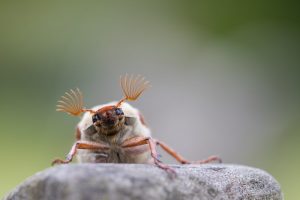
Smiling Maybug, by Yasmin Bedford, Headington Prep School (2018)
There are also some great resources from Open Air Laboratories, which was a citizen science programme led by Imperial College London from 2007 to 2019. Over 1 million people participated, contributing to important information about their local environments and helping scientists understand big problems such as loss of biodiversity and climate change. The Bug Count Survey was part of this programme. Although the project has ended, you can still use their helpful guides to identify bugs in your environment. Have a look at their Invertebrate Identification Guide.
4. Pestie or Bestie!
Try out exciting insect-based activities and have fun along the way with Oxford University’s Museum of Natural History Learning Zone. Have a go at designing your own insect, create a game of lifecycles or a bug board-game, and play Pestie or Bestie!
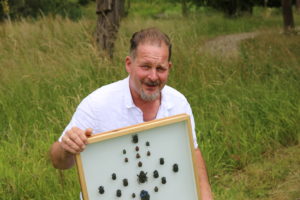
Insects and their habitats with the Oxford University Natural History Museum
5. A bug’s life at the Science Oxford Centre
Visit us for our Nature Club, Family Day or STEM Club on Saturdays and get outdoors with an Explorer Backpack. With a bug pot, magnifying glass and ID guide, go on nature trails and see what creatures and habitats you can spot. Why not share your finds with us @scienceoxford #insectweek. You can also check out our dedicated Science Oxford Centre Nature Instagram with our resident ecology expert, Dr Roger Baker.
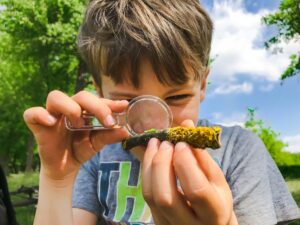
Explorer Backpacks at the Science Oxford Centre
Enjoy the outdoors, learn more about insects and have fun!
Recommended by:

Alice Draper
STEM Projects Officer
